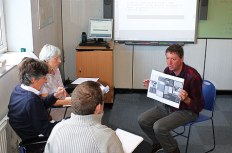In the 6 years I’ve been teaching I’ve encountered a lot of negative attitudes towards professional development. Sure, at times I’ve been negative or cynical too – no-one’s perfect! It’s just that over the last few years I’ve really come to value the opportunities I get to develop my practice. That makes me feel guilty for being negative towards development opportunities in the past.
I’ve come across plenty of teachers who don’t share my opinion. In almost every teaching job I’ve had there’s been at least one, sometimes many people who don’t take kindly to staff development sessions. I understand when people have disagreements about the content of a session, or annoyances over its poor scheduling. I also understand that not everyone wants to (or feels they need to) develop their skills. That’s up to them. However, I’ve heard some pretty negative feedback about training sessions in the past that really wasn’t conducive to a positive staffroom environment. Not only have I heard it, I’ve actually said some of the comments below myself. I feel like a terrible person right now…
‘that was all just common sense’
What makes this a difficult comment to hear is twofold. Firstly, if you’re speaking to someone who felt that the development session was fruitful and that they took a lot from it, you’re condescending them a bit. Secondly, the development session itself may have come about due to reflection from the management team about what staff need to improve on. If you felt that the content of the session was straightforward or obvious you could be right, or you could be refusing to reflect on your own areas for development.
‘that’s an hour of my life I’m never getting back’
It’s also at least 3 hours of time that the person taking a session has put in to plan it and deliver it. Even if you didn’t take anything concrete from a session, there’s plenty more you can gain from it. It’s a chance to build rapport with colleagues, understand others concerns and their stage of development as teachers, share your own ideas which complement the topic, etc.
 exceptional chesting…
exceptional chesting…‘I hate it when they treat us like we’re students’
Some teachers seem to really hate it when a trainer does the ‘CELTA’ act: every time they present a handout it’s always chested, they use ICQs, praise, funny noises and gestures to organise teachers into pairs, etc. I quite like it! It models good practice. Each to their own though. This is not really a negative attitude to development sessions as a whole, more the style of delivery.
‘I thought this was going to be about practical activities…’
I’ve been to talks before which have covered more research or theory than they have practice. However, normally teaching practice is underpinned by some kind of theory. I can see why people think that just because they leave an input session without something to directly apply in the classroom the next day then the session has been a waste of time.
It seems strange to neglect or simply dismiss a wealth of research into ELT (which could inform our practice) on the basis that it ‘has no practical application’. It’s often written by people with a wealth of practical experience! Personally, I find it quite interesting to understand the theory behind what I do. It helps me engage more.
Penny Ur makes some good points in this article about our attitudes toward ELT research and literature, it’s well worth a read.
I’m not trying to be all ‘peace and love’ here or anything, but sometimes it might do us good to reflect on how our comments might affect our colleagues, and how they define the way we’re perceived by others in the workplace.
If you’re still reading, that’s just been 5 minutes of your life that you’re never getting back…
Update: Here’s a great post by Sandy Millin on how to make development sessions more varied. Watch this space for a post on quality circles too. Enjoy!
Categories: General


And thirty minutes writing that went into sharing from you! Thanks for voicing an opinion I oftrn feel unpopular for holding.
LikeLiked by 1 person
Phew, I’m glad you agree! I feel like I have to bite my tongue sometimes when people get so negative about training. Do you ever deliver training sessions yourself? I fear doing it due to this type of feedback!
LikeLike
I completely agree with you. Training session can be a tough topic to approach with co-workers and in some institutes they may not be the most practical, but you know what? At the end of the day, I think we can always walk away with something that we can apply in our classes (at one point or another). I think that’s the point.
Although, on a personal note, I do think that teacher training in general should also be revamped so that teachers feel motivated to attend, learn more about teaching and grow professionally.
LikeLiked by 1 person
Yeah, I’m with you on that. It’s a shame when teachers lack motivation to develop. The times I’ve felt like that have been times when the training on offer was infrequent, often cancelled, topics chosen at random, and more input than workshop style. This can have a big impact on motivation I think. Do you give training sessions yourself?
LikeLike
Hi! Yes, I give training sessions and try to break the mold. My training sessions rarely go 10 minutes of me just talking. It’s usually me setting the stage for them to reach the target we’re trying to get to while they share their own experiences. I call them ThinkTanks just like my blog is titled. Check it out 😉
LikeLiked by 1 person
And five minutes worth spent!
In fact I find that the people who are the hardest to shift are the ones who say it was worthwhile then make no change in the classroom as a response to it.
At the same time I do have to say that there are great trainers and extremely average trainers. The buck must fall back to the trainer rather than the bored teacher. As a teacher has to inspire the student, so does the trainer with the teacher.
At the same time I personally can’t bare training that has really big long winded language that only academics can make sense of. I do like the practical side too…we are all practitioners and need this with some back up reasoning why it is worth while, I would say 90% of the time.
LikeLiked by 2 people
My colleague just said something similar about trainers. You’ve got a point. I was terrible when I first started teaching, but one trainer I had in my first job was incredibly patient and inspiring. I still remember his input sessions, which shows the impact it had. What else do you think makes a good trainer?
LikeLiked by 1 person
All the same things as a good teacher, but up a notch. You have to inspire, give a whole new perspective and whatever you are passing onto people has to be something they can implement and relate to. The hardest part is the inspirational part, not everyone is inspirational.
LikeLike
I enjoy any professional development sessions because even if I don’t learn new things, I can be reminded of some I might have forgotten about over the years. Besides it’s fun to interact with young and less experienced as well as older and more experienced teachers. Everyone has something to offer.
LikeLiked by 1 person
You all couldn’t help sounding as selfjustification of your action as teacher trainers. Did you ckeck that you had been hired to train about somehting it had been detected as necessary (needs assessment and fufilment)?.
LikeLike
Hi Mafracasu, thanks for sharing your views. When I wrote the post I did feel I was being a bit ‘holier than thou’, but then realised that I was writing about some comments I myself had made about training sessions, not just others! I’m not a teacher trainer, I’ve only been teaching a short time. I enjoy hearing the comments from trainers though, I feel they are fair points. So you don’t feel that your needs as a teacher are being met by your trainers? Sounds intriguing, tell us more!
LikeLike
In my experience, when it’s good, we appreciate it. When it’s useful or new, it’s inspiring. Teachers give up a lot of their free time in ways other professions don’t expect their employees to. Something to consider before bashing teachers for negativity.
LikeLiked by 1 person
Very true! I think that’s part of the problem – some teachers have to give up FREE time. Not all schools offer development sessions as part of contracted, paid, hours. A lot do though. At one school I worked at the bitterness towards training sessions was mostly due to them being at 1pm on a Friday. Nobody had teaching hours on Friday afternoon, nobody got paid for the training and everybody wanted a long weekend! Financial incentive may have helped in that situation.
LikeLike
Hi Pete,
It’s good to see these comments in one place, and to make me think about whether I’ve said any of those things myself – I’m sure I have. As a teacher trainer and DoS now, I’m very aware of how my training sessions might come across (or at least try to be!) and am constantly trying to make sessions as relevant as possible to the teachers involved. I agree that some people resent the fact that they have to give up their time, but perhaps they could consider giving sessions themselves if they think that they can do better (!) I put together this list of possible alternatives to Friday afternoon seminars as part of my thinking process about how to make training and development a bit more inspiring/interesting/relevant: https://sandymillin.wordpress.com/2015/11/15/alternatives-to-the-friday-aftenoon-seminar/
By the way, with the kind of information you share on your blog and the way you present it, I’m confident that you’d be perfectly capable of delivering training sessions. Good luck!
Sandy
LikeLiked by 2 people
Hey Sandy, your post is excellent! Can I add it to the end of this post? I think I came across that a while back actually – the ‘action research project’ idea is close to something I’ve set up recently at BC Bangkok, so maybe I got it from you?!? My colleague and I have organised a quality circle, which involves sending teachers away to research a topic or try out ideas and to report back in a workshop/INSETT. It’s working really well so far. I think the fact that it’s quite autonomous and doesn’t have to involve the management helps it work actually, but I’ll blog about it soon to explain further!
It’s great to hear that you are always trying to develop your approaches to engage trainees. What’s been your best ever training session to date? Why was it so successful?
I will certainly try out a few things on that list too. We have ‘chat and chew’ here at the BC which is a bit like the coffee approach, we have the odd swap-shop too. On the whole the input sessions here are really good.
Cheers for final comment… think I’ll wait a while before I deliver training sessions though. Only one year post-Dip experience so far!
LikeLike
Hi Pete,
You’re very welcome to add a link to the post. It sounds like you’ve got a lot of interesting things going on there already, and I look forward to reading your post about it.
I’m not sure if I can pick a best-ever training session – a lot has depended on the audience, and hopefully people can get something from each of them, but who knows. I really like the swapshop style ones because it helps everyone to realise that they have something to share – they don’t just have to listen to other people lecturing them. That’s also how I started presenting. We did a resource swapshop at school a couple of weeks ago and it went really well – everyone had to choose something they’d used from the staffroom which they thought other people might not know about, tell people where to find it and offer one or two activities they could do using it. Everyone seemed to enjoy it 🙂
By the way, if I’d waited to build up my post-Delta experience before training, I’d still be waiting I think 😉 I was doing training sessions through IH Sevastopol before I finished the Delta (I’d done two parts, and had the exam halfway through my year there), and had done one or two sessions in Newcastle already too. I started as a CELTA tutor eight months after I finished Delta, and I haven’t looked back since. If you can blog and present at conferences, you’ll be fine! No pressure though 🙂
Sandy
LikeLiked by 1 person
Hi Pete
Thank you for your post.
I started on training sessions straight after my DELTA and even did a couple (very ill-advised) ones before. I still have an awful lot to learn when it comes to delivering INSETTS which don’t give rise to the comments you listed in your post, but I think it’s best to jump straight in and try it out. You’ve got an awful lot of experience and always share interesting ideas!
Go for it!
LikeLiked by 2 people